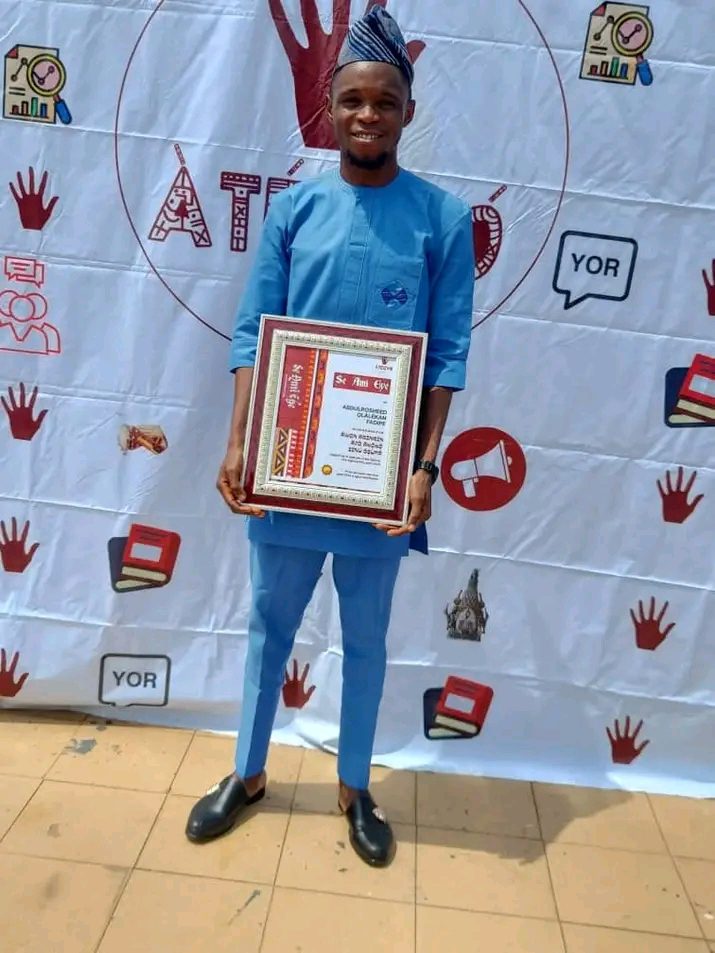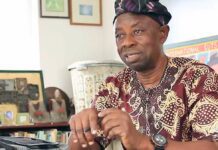We recently interviewed Abdulrosheed Fadipe. He is a native of Ila-Orangun, Osun State, Nigeria. He studied English/Political Science and Education at Adeshina College of Education and graduated in 2020. His entry, Àwọn Arìnrìn-àjò Àkọ́kọ́ S’ínú Òṣùpá, won the translation category of the 2024 Àtẹ́lẹwọ́ Prize for Yorùbá Literature.
What do you do for a living?
I am a freelance writer and translator. I provide high-quality translation and multilingual content creation services for individuals and clients who want their contents to resonate with their audience.
Does your educational background influence your writing and translating work?
Well, yes. My undergraduate studies in English provided a strong foundation in grammar, syntax, and clear writing.
My background in Yoruba, having learned it throughout primary and secondary school, gives me a deep well of vocabulary and a strong grasp of the language’s structure. Furthermore, reading Yoruba novels during my studies further enriched my understanding of the language’s flow and cultural references.
Can you, for the benefit of our enthusiastic Yoruba readers, tell us some of the Yoruba texts that influence your interest in writing in Yoruba?
All the works of D. O. Fagunwa influenced my interest in writing in Yoruba. These classic stories not only entertained me but also introduced the rich proverbs, metaphors, and storytelling techniques that are such a hallmark of Yoruba writing.
Bode Ọ̀jẹ̀’s Ìrìnàjò Sínú Ayedimeji, Akinwumi Isola’s Oleku, Kehinde Awotayo’s Baba Ìgbómìnà, et cetera.
All of these works continue to influence my writing in Yorùbá. They inspire me to use the language creatively and effectively share stories and ideas.
Have you always known you would be a writer?
While I don’t remember a specific moment of deciding to be a writer, I can tell you I’ve always loved stories. As a kid, I loved reading books and most importantly telling stories. I can say I enjoy expressing myself through words.
How did your translation journey begin?
For as long as I can remember, I have been fascinated by languages. In secondary school, I took all language courses offered, and English and Yoruba became my favourites.
I started by trying to express some ideas I have learnt in one language in another. Translating felt like a natural way to combine my love for both languages and share stories and ideas across cultures.
My translation career started when I was about finishing my undergraduate studies. I took a translation course. Afterwards, I came across a translation job offer advertised on LinkedIn. A foreign company needed freelance linguists who can help them translate their content which they were using to build an AI tool and corpora. I applied for the job and the rest is history.
What has been your most challenging experience in translation so far?
Humor, idioms, and proverbs can be incredibly tricky to translate. What might be funny in English might not translate well into Yoruba, and vice versa. The challenge is finding an equivalent expression that express the same meaning and cultural context for the Yoruba audience. For instance, when I was translating one of H. G. Wells’ book into Yoruba, I found it difficult to express some English concepts in Yoruba.
Sometimes I come across technical documents filled with industry-specific vocabulary that may not have direct Yoruba equivalents. In those cases, I have to do some in-depth research to find the most accurate and understandable way to express those technical concepts in Yoruba.
It can be a puzzle, but I find it rewarding to bridge those linguistic gaps and ensure the translated text is clear and effective for the Yoruba reader.
On 9th of March, this year, Àwọn Arìnrìn-àjò Àkọ́kọ́ S’ínú Òṣùpá, your translation of H. G. Wells’ novel titled The First Men in the Moon, won the translation category of the recent Àtẹ́lẹwọ́ Prize for Yorùbá Literature. How did it feel to be recognized at that level? What was the experience like?
Well, winning the Àtẹ́lẹwọ́ Prize for Literature in the translation category for my Yoruba translation of H.G. Wells’ The First Men in the Moon (Àwọn Arìnrìn-àjò Àkọ́kọ́ S’ínú Òṣùpá) was truly an unforgettable experience.
Translating that novel was a labor of love for me. Finding the right words to capture the wonder and excitement of lunar exploration in Yoruba was both challenging and exhilarating.
So, when I received the news about the award, it felt like a validation of that effort. A well-deserved recognition. It wasn’t just about me; it was a recognition of the power of translation to connect cultures and introduce new worlds to a Yoruba audience.
The prize giving ceremony itself was incredible. Being surrounded by such talented Yoruba writers and seeing the positive reception for the book was incredibly humbling. It fueled my passion for translation even further and inspired me to keep finding ways to bring great literature to the Yoruba world.

Your work has been arguably described as “the first translation of any mainstream English Science fiction into Yorùbá language”? Were there works related to sci-fi in Yoruba language that inspired you during the translation process? How were you able to handle the technological usage gap between English and Yoruba?
While there may not have been a wealth of established Yoruba sci-fi, I did find inspiration from Bode Ọ̀jẹ̀’s Ìrìnàjò Sínú Ayedimeji. The book is the first science fiction novel in Yoruba language. I recommend it to all Yoruba sons and daughters.
Translating the technological aspects was definitely a challenge. Yoruba already has words or expressions for some scientific concepts, like lálá tó ròkè ilẹ̀ ló ń bọ̀ (law of gravity). Building on this base, I looked for creative ways to adapt existing words or coin new terms to represent technological advancements. I also consulted some Yoruba linguists to discuss the most appropriate ways to translate scientific terms while maintaining the language’s natural flow.
For a while now, there has been a decline in the use of Yoruba both in speech and writing. There is infiltration of English words in the speech of an average Yoruba person. What do you think is the cause and what is the way out?
You’re right, there’s a concern about the decline of Yoruba usage in speech and writing.
I think this is caused by the dominance of English. We literally use English for everything in this part of the world. It is the language of education and administration. We use it for business, even in places of worship. This dominant usage of English can lead younger generations to see Yoruba, and other indigenous languages, as less important or valuable. Another factor is the limited amount of contents readily available in Yoruba. This reduces exposure and motivation to use the language.
I think the way out is promoting Yoruba in education. Yorùbá should be used as the medium of instruction for some subjects at the primary and secondary level of education. We should support the creation of high-quality Yoruba contents like books, movies, music, and educational resources. This makes Yoruba more engaging and relevant for younger generations. Then, we should encourage parents to speak Yoruba with their children at home and create a positive language environment. We should also develop language learning apps and online resources that make learning Yoruba fun and accessible. Promoting awareness of Yoruba’s rich literary heritage, music, and traditions can also go a long a way in the appreciation of the language
Revitalizing Yoruba won’t happen overnight, but through a combination of these efforts, we can ensure this beautiful language continues to thrive.

Are there any upcoming projects readers should expect from you? Or platforms they should look out to for your writing?
I am currently working on a book. I can’t reveal the title yet, but it is a story that I believe will resonate with readers. Readers can also stay updated on my writings by subscribing to my Substack blog.
One last question. Which is easier for you? Writing or translating?
You know, translation is a form of writing. I can say I enjoy both.
Read Also:
- Studying English at OAU helped boost my regard for Yoruba language — Ilobu-born writer
- From Fagunwa to Isola: The Translation Narrative of Yoruba Works Continues
 WHATSAPP: Click HERE to join the new Literature PADI WhatsApp group to receive latest updates on your phone and for further literary discussions!
WHATSAPP: Click HERE to join the new Literature PADI WhatsApp group to receive latest updates on your phone and for further literary discussions!









